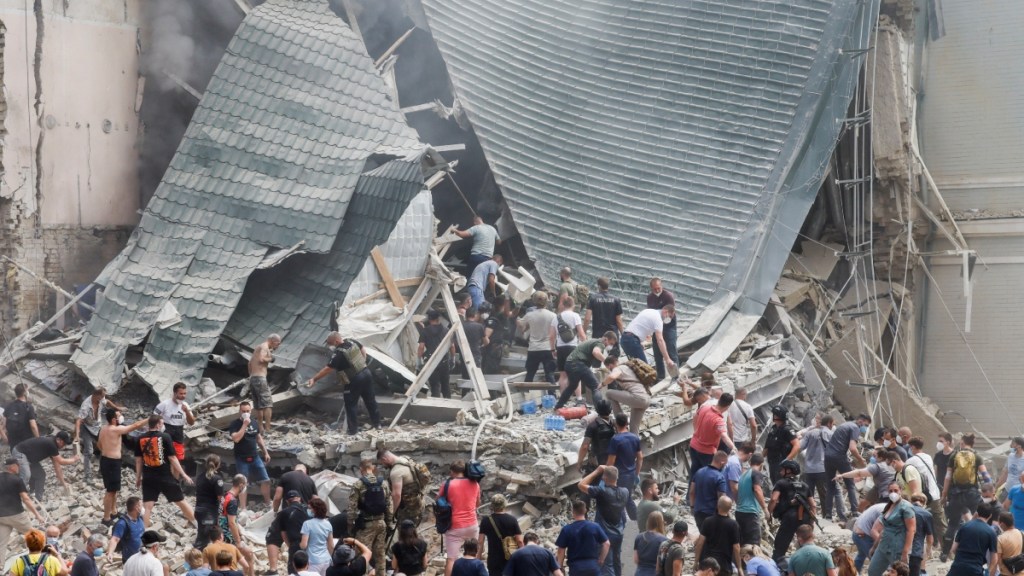Ukraine‘s recent incursion into Russia’s western province of Kursk has garnered global attention, sparking intense speculation about the motivations and potential outcomes of this audacious move. The unexpected offensive, which has seen Ukrainian forces penetrate approximately 10 kilometers into Russian territory, has disrupted the ongoing dynamics of the Russia-Ukraine conflict, raising critical questions about Ukraine’s strategic objectives and the potential repercussions on the broader war effort.
For the past six days, Ukrainian forces have engaged in fierce combat within Kursk, inflicting significant casualties on both Russian soldiers and civilians. Reports from the local administration indicate that around 76,000 Russian citizens have been displaced due to the fighting, seeking refuge in temporary camps. Moreover, Ukrainian forces have reportedly taken Russian soldiers’ hostage, with videos of these captures circulating widely, adding to the already tense situation.
The international community, particularly NATO and the United States, has been caught off guard by Ukraine’s unilateral action. Notably, Ukrainian President Volodymyr Zelensky did not inform any allied countries about the operation in Kursk, raising concerns and questions among Ukraine’s supporters. John Kirby, a spokesperson for the White House, expressed surprise at the operation, emphasizing that the US is eager to understand Ukraine’s objectives in Kursk. Despite the lack of prior consultation, the U.S. has continued its support for Ukraine, announcing the delivery of a new consignment of weapons, including Stinger missiles, HIMARS, and anti-tank weaponry, intended to bolster Ukraine’s defence against Russian aggression.
This sudden escalation comes at a time when diplomatic efforts to end the war appeared to be gaining momentum. In June, a summit was held in Switzerland aimed at initiating peace talks, though Russia chose not to participate. In response, Zelensky proposed holding the next summit in a Global South country, hoping to secure Russian participation. For over two years, Zelensky has maintained that peace talks would only be possible if Russia vacated the Donbass region. However, Russian President Vladimir Putin has consistently rejected this demand, instead insisting that Ukraine must withdraw from Donbass and renounce any aspirations of joining NATO—conditions that have stalled any meaningful progress towards peace.
Zelensky’s recent rhetoric suggests a shift in strategy, with the Ukrainian leader hinting at the possibility of preparing a draft for peace talks by November. In a recent post on X (formerly Twitter), Zelensky asserted that “the war will end only on the strength of power,” signalling his belief that Ukraine’s military actions could serve as leverage in future negotiations.
The capture of Kursk could indeed provide Ukraine with a stronger bargaining position at the negotiating table, particularly concerning contentious regions like Donbass and Crimea. However, the sustainability of Ukraine’s hold on Kursk remains uncertain. The Russian Defence Ministry has reported significant Ukrainian losses since the start of the operation, claiming that over 1,350 Ukrainian soldiers have been killed and numerous military assets, including tanks, armoured vehicles, and artillery, have been destroyed.
Furthermore, the implications of Ukraine’s attack extend beyond the immediate battlefield. Belarus, a close ally of Russia, has begun mobilizing its forces in response to the situation in Kursk, potentially opening a new front in the conflict. If the Russian military fails to repel the Ukrainian forces, Belarus’s involvement could significantly complicate Ukraine’s strategic calculations.
In conclusion, Ukraine’s incursion into Kursk represents a bold and risky manoeuvre that has the potential to reshape the course of the conflict. While it may offer Ukraine greater leverage in future peace talks, the operation also carries substantial risks, including the possibility of escalating the war and drawing in additional adversaries. As the situation unfolds, the world watches closely, uncertain of whether Ukraine’s gamble will lead to a breakthrough or a setback in the pursuit of peace.

